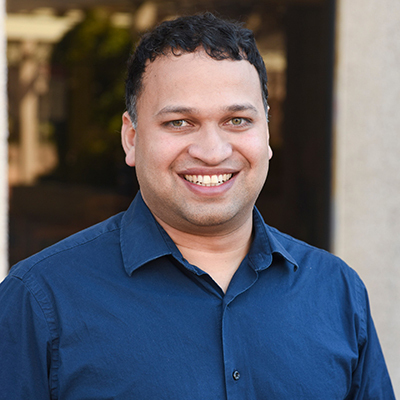Twisting, writhing, breaking: the role of DNA mechanics in neuronal transcription
Neuroscience Institute , Neuroscience
November 7, 2024 @ 11:00 am to 12:00 pm
008 Mueller Laboratory
University Park
Featuring:

Ram Madabhushi
UT Southwestern Medical Center
Abstract:
Exposure to new sensory experiences activates new gene transcription programs in neurons and the products of these genes mediate the development of lasting adaptive behaviors. Our studies suggest that the actions of TOP2B affect both basal and stimulus-driven gene activity states in important ways. We previously reported that when stimulated, neurons induce TOP2B to form DNA double strand breaks (DSBs) within the promoters of specific immediate early genes and that these DSBs then facilitate the rapid transcription of these immediate early genes. Here I describe our latest findings on how DSB formation by TOP2B is coupled to neuronal stimulation and how TOP2B activity is modulated to induce DSB formation at only a few sites.
Recently, we developed new methods to map sites of catalytically engaged TOP2 and applied these methods to assess the distribution of catalytically engaged TOP2B in cultured mouse cortical neurons. These efforts revealed that the catalytic engagement of TOP2B is largely curtailed within the promoters of actively transcribed genes and that its engagement within gene bodies is regulated by specific histone marks, such as H3K36me3. Surprisingly, we report that either poisoning or inhibiting TOP2B stimulates transcription initiation both at transcription start sites of genes and from cryptic sites within long genes. These results provide new insights into why TOP2B is specifically required for the transcription of long neuronal genes.
About the Speaker:
Dr. Madabhushi graduated with a bachleor's degree in Biology from the University of Bridgeport in Connecticut. He obtained his PhD in Molecular Biology from Weill Graduate School of Cornell University in New York, where he studied how cytokinesis is coordinated with chromosome segregation in the bacterial model organism, E. coli.
Subsequently, Dr. Madabhushi conducted his postdoctoral research at the Picower Institute for Learning and Memory at MIT, where he studied mechanisms governing genomic stability and activity-dependent gene expression in neurons.
Dr. Madabhushi joined the faculty in the Department of Psychiatry in 2017.

Contact
Yingwei Mao
yzm1@psu.edu